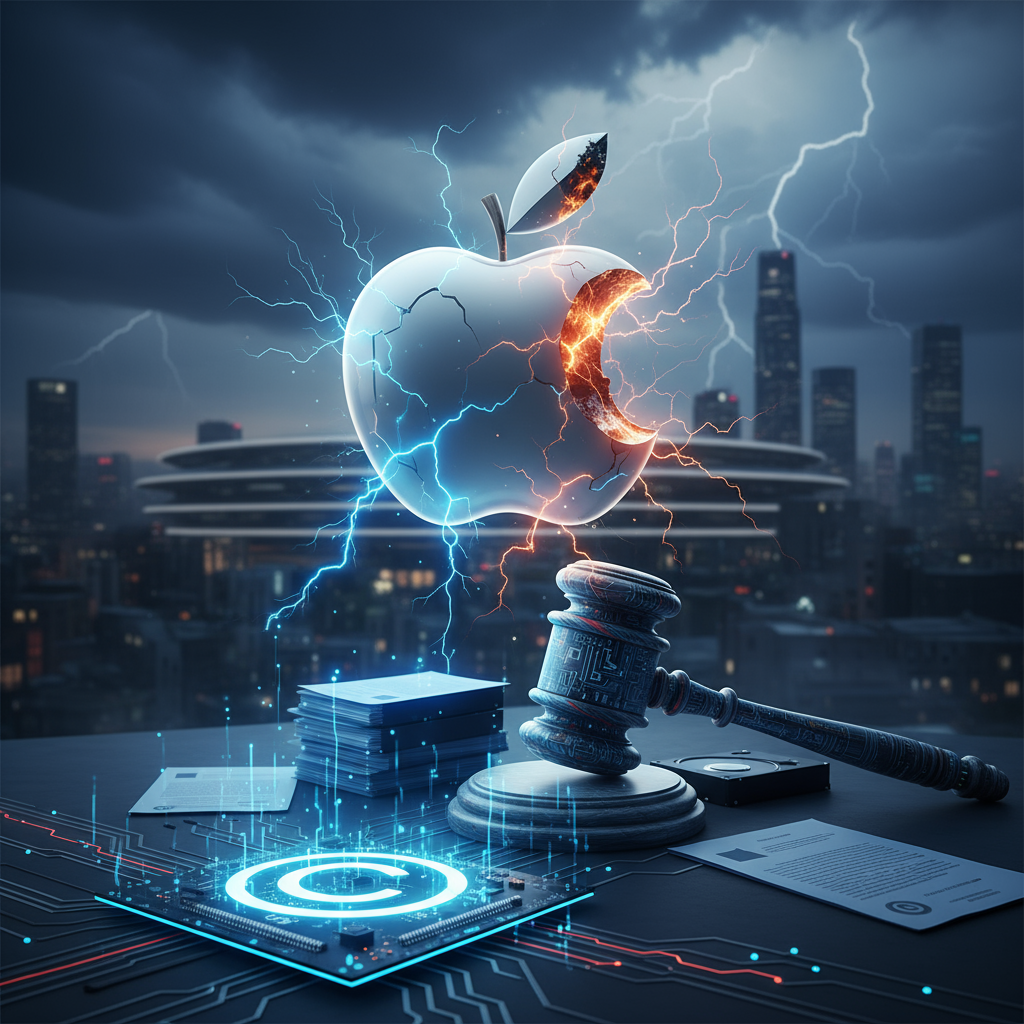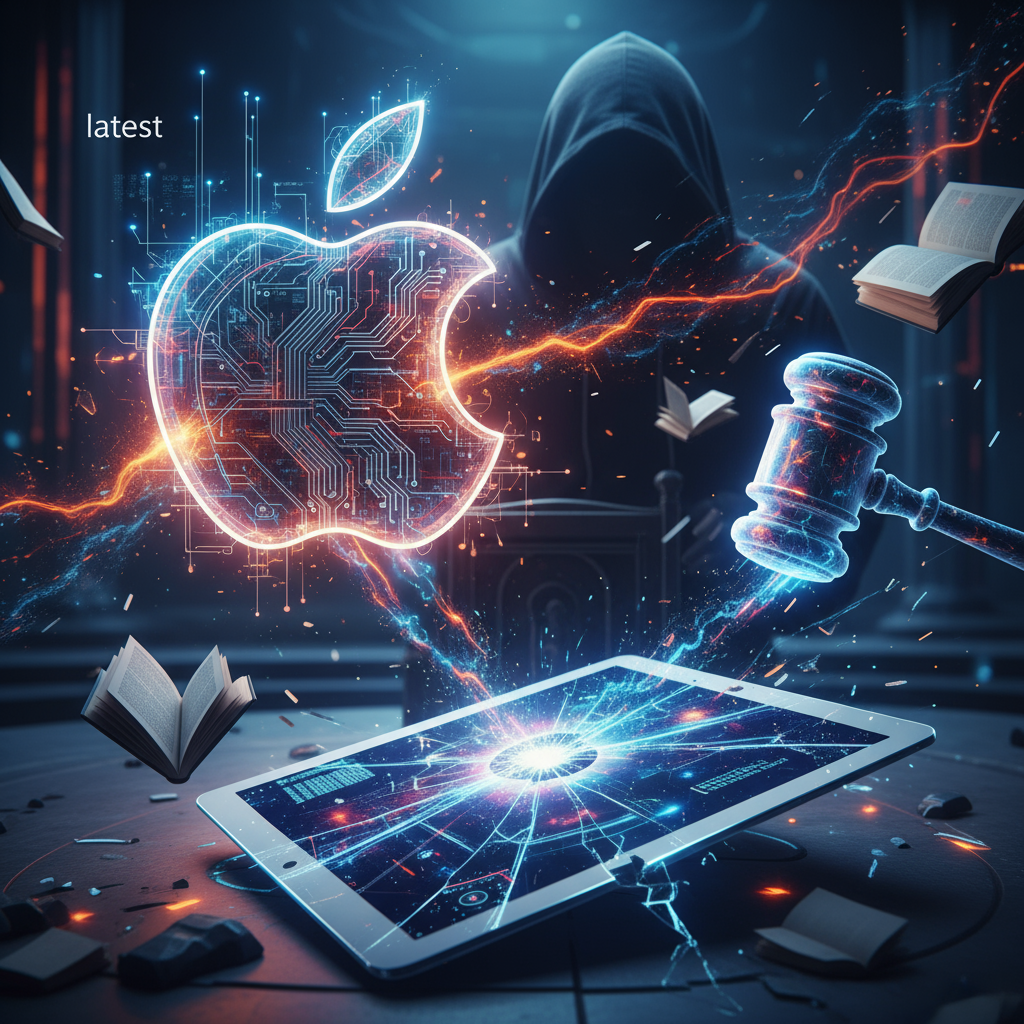Apple’s AI Ambitions Under Fire: Another Copyright Lawsuit Looms

The tech world is abuzz, and not for a new iPhone launch or a groundbreaking software update. Instead, Apple, a company synonymous with innovation and meticulous design, finds itself once again in the legal crosshairs over alleged copyright infringement. Just a month after facing accusations of using pirated books to train its artificial intelligence models, a new, similar class-action lawsuit has been filed. This isn’t just a minor blip on the radar; it signals a growing legal challenge to the very foundation of how AI is being developed and trained by tech giants.
This latest legal skirmish highlights a critical ethical and legal debate: can AI models legally “learn” from copyrighted material without explicit permission? As companies like Apple invest heavily in AI, the methods they employ to gather and process data are coming under intense scrutiny, with creators increasingly demanding accountability and fair compensation.
The Latest Allegations: Neuroscience, Shadow Libraries, and Unauthorized Use

The new proposed class-action lawsuit, first reported by *Bloomberg Law*, originates from an unexpected quarter: two neuroscience professors from SUNY Downstate Health Sciences University in Brooklyn, NY. Professors Susana Martinez-Conde and Stephen Macknik claim that Apple used their “registered works without authorization” to train its AI models. This isn’t a vague accusation; it points directly to specific copyrighted materials allegedly used without permission.
The professors allege that Apple leveraged “shadow libraries” and “web-crawling software” to access a trove of pirated, copyrighted books. The term “shadow libraries” itself conjures images of illicit digital archives, repositories of books and other content available outside of traditional, legal channels. If these allegations hold true, it suggests a systemic approach to data acquisition that sidesteps copyright protections, potentially on a massive scale. For creators like Professors Martinez-Conde and Macknik, whose intellectual property forms the basis of their professional endeavors, this alleged unauthorized use is a direct threat to their livelihoods and the integrity of their work.
A Pattern Emerging: Not Apple’s First Rodeo
What makes this lawsuit particularly significant is that it’s not an isolated incident. As mentioned, this latest filing comes hot on the heels of another similar lawsuit brought against Apple just a month prior. That case also centered on the alleged use of pirated books for AI training. This emerging pattern suggests a larger strategy or at least a recurring issue within Apple’s AI development efforts.
When multiple lawsuits with similar core accusations surface against the same company in a short period, it raises serious questions about their data sourcing practices. Is Apple, a company with ample resources and a reputation for legal prudence, knowingly skirting copyright law, or are there gaps in their internal processes that allow for the unauthorized ingestion of copyrighted material? The answers to these questions will have far-reaching implications for the entire AI industry. The legal precedents set by these cases could redefine the boundaries of “fair use” in the age of generative AI.
The Broader Implications for AI Development and Copyright Law
These lawsuits against Apple, and similar ones against other tech companies, are part of a much larger, global conversation about AI and intellectual property. The very nature of “training” an AI model involves exposing it to vast datasets, often encompassing billions of pieces of information. If a significant portion of that data is copyrighted and used without permission or compensation, it creates a massive legal and ethical challenge.
Here’s why this matters:
- Fair Compensation for Creators: Authors, artists, musicians, and other content creators rely on copyright to protect their work and ensure they are compensated for its use. If AI models can freely ingest and learn from their creations, it devalues their work and undermines their ability to earn a living.
- The Future of Generative AI: Generative AI, capable of creating text, images, and other media, is typically trained on existing content. If companies are restricted from using copyrighted material, or if the cost of licensing becomes prohibitive, it could significantly impact the development and capabilities of these powerful new technologies.
- Redefining “Fair Use”: Current copyright law includes provisions for “fair use,” which allows limited use of copyrighted material without permission for purposes like criticism, comment, news reporting, teaching, scholarship, or research. The question is whether training an AI model falls under these existing exemptions. Courts will need to grapple with how to apply these decades-old laws to a rapidly evolving technological landscape.
- Trust and Transparency: For AI to be widely adopted and trusted, there needs to be transparency in how these models are built and what data they are trained on. Allegations of using “shadow libraries” erode public trust and invite regulatory scrutiny.
The outcomes of these lawsuits will likely shape the legal framework for AI development for years to come. They will force tech companies to be more transparent and meticulous about their data sourcing, and they may lead to new licensing models or even statutory changes to address the unique challenges posed by AI.
A Crossroads for Apple and the AI Industry
Apple finds itself at a critical juncture. As it deepens its investment in AI, these lawsuits serve as a stark reminder that technological progress cannot outpace ethical considerations and established legal frameworks. The company has largely remained silent on the specifics of these lawsuits, which is typical for ongoing legal battles. However, the sheer volume and similarity of the accusations suggest a systemic issue that needs to be addressed.
For the AI industry as a whole, these cases are a wake-up call. The “move fast and break things” ethos that characterized earlier waves of tech innovation is proving untenable when it comes to intellectual property. Moving forward, AI developers will need to prioritize responsible data acquisition, potentially exploring robust licensing agreements, developing ethically sourced datasets, or even contributing to new legal frameworks that better accommodate the needs of both creators and AI innovators. The balancing act between innovation and protection is delicate, and how Apple navigates this challenge will be closely watched by creators, competitors, and the public alike.

